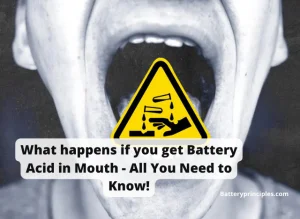Have you ever experienced a drop in battery voltage while driving your vehicle? It can certainly be a frustrating and sometimes dangerous situation. What causes this?
Today we will look at the causes of battery voltage drops while driving and what you can do to prevent this from happening.
A vehicle’s battery provides power to start the engine and operate electrical systems. Several reasons can cause the battery voltage to drop while driving, causing vehicle problems.
Common Signs of Voltage Drop Issues
Do you want to know what common signs you should look for to know if your battery voltage drops while driving? Below are some of the signs you must watch out for:
- Low cranking speed: If your battery is unable to provide enough power during start-up, it might be due to a voltage drop.
- Lights Dimming: If the lights in your vehicle are dimmer than expected, it could be due to a voltage drop.
- Overheating Battery: If your battery overheats due to constant use, it can lead to a voltage drop.
- Poor fuel economy: A poorly performing battery can affect the overall efficiency of fuel economy.
Why does my car battery voltage drop while driving
Here are eight reasons for a drop in battery voltage and what you can do about them.
1. Alternator failure

©mavink.com
A vehicle’s electrical system relies heavily on its alternator. Its primary function is to generate electricity to power the vehicle’s electrical systems when the engine is running. Additionally, the alternator recharges the battery while driving. So it is maybe the main reason for battery voltage dropping while driving.
If the alternator is not working properly, the voltage at the battery may drop, causing problems starting the vehicle. Common alternator problems include a failed diode, a worn alternator belt, and a failed alternator pulley.
2. Loose battery connections

©reddit.com
The battery cannot effectively power the engine if it has loose connections. It becomes loose over time due to vibration or wear-and-tear, it can result in poor contact points leading to drops in voltage levels across all systems connected – including those related directly back to powering up someone’s car engine/battery setup!
Make sure everything is tightly secured down using appropriate tools & materials whenever possible; otherwise have someone else take care of it who knows how best to handle such tasks safely without causing further damage.
3. Short circuits Issues
Electrical issues such as short circuits and faulty wiring can cause battery voltage drops while driving. It occurs when an electric current finds a low resistance path and begins to flow through it.
This can cause a significant drop in the battery voltage, making it difficult for the vehicle to start. Faulty wiring can also cause a voltage drop, as well as other problems with the electrical system.
4. Use of high-demand electrical components.

©amazon.com
High-demand electrical devices such as air conditioners, high-wattage audio systems, headlights, and power windows consume electricity quickly and cause battery voltage drops while driving.
If you have a high-demand electrical component, it is good to limit its use while the vehicle is running, upgrade your battery to one with a higher capacity or install an additional one.
5. Battery sulfation (Corrosion )

In general use, the most common cause of battery voltage dropping while driving is battery sulfation.
Battery Sulfation is the formation of lead sulfate crystals on the surface and in the pores of the active material of the battery’s lead plates.
Too many of these crystals can corrode the lead terminals, causing unstable connections between terminals and current dissipation.
It is a good practice to remove these deposits as soon as they occur and protect the terminal with threaded vaseline or suitable grease. Then with sealed batteries, the inconvenience is significantly reduced.
6. Old batteries

The capacity of a battery decreases as it ages. It can cause a steady drop in battery voltage over time, making the vehicle difficult to start. Changing an old battery may be necessary if it is old. Battery replacement is recommended every 4-5 years depending on usage and conditions.
7. Incorrect battery size
Using a smaller battery than your vehicle needs may cause a drop in voltage while driving. A battery that is too small may not be able to keep up with the power demand from your vehicle’s electrical components, causing the voltage to drop.
To prevent this, make sure the battery you use is the right size for your vehicle. You can find your car’s battery group size in the battery section of the owner’s manual or on the battery’s top or side.
How many watts in a 12-volt battery – Unlocking the Mystery of 12v Battery Capacity
Battery principles
8. Extreme weather conditions
Extremely hot or cold temperatures directly affect battery performance and cause voltage drops.
The battery can overheat at extremely hot temperatures, reducing its capacity to hold a charge, and if the temperature is extremely cold, the battery may slow down, making starting the vehicle challenging. If you live in an extremely hot or cold area, it is necessary to take care of your battery and keep it in good condition.
Note: The extreme hot temperature is defined as 38°C/104°F or higher, and the extreme cold temperature is below the freezing point of water (0 °C/ 32 °F).
Why battery gauge goes up and down
The ups and downs of the battery gauge can be a confusing situation. It is a common issue that can be caused by several factors, including:
- Loose or corroded battery terminals
If the battery terminals are loose or corroded, it can cause the battery gauge to fluctuate.
- Alternator issues
If the alternator is not functioning well, it can cause the battery gauge to fluctuate.
- High demand
High electrical demand from components such as audio systems, lights, and air conditioners can cause the battery gauge to fluctuate.
- Dead battery
A failing battery can cause the battery gauge to fluctuate.
- Sensor problems
A faulty battery gauge sensor can cause the gauge to read inaccurately.
It is wise to diagnose any fluctuations in the battery gauge to prevent potential damage to the battery or other electrical components. Regular maintenance, checking for loose connections, and ensuring all electrical components are functioning properly can help prevent fluctuations in the battery gauge. If the problem persists, it is best to have the battery and electrical system inspected by a professional.
How Long Does It Take To Charge The Ryobi 40v 6ah Battery?
battery principles
How to prevent the Battery voltage dropping while driving
- To prevent the battery voltage dropping while driving, the best advice is to use the vehicle as much as possible. Regular driving will help keep the battery charged and prevent loss of power. If you won’t be using the car for a few months, you can disconnect the battery to extend its life.
- Check the vehicle alternator because a faulty alternator can prevent the battery from charging while driving.
- Keep an eye out for electrical systems in your car that drain the battery, such as lights, audio systems, or air conditioners.
- Make sure battery terminals and cable connections are clean and secure. Loose or corroded connections can prevent the battery from charging while driving.
- Clean the battery and terminals regularly to prevent corrosion that can prevent the battery from charging.
- If your battery is old or low-capacity, upgrade to a new, higher-capacity battery.
- Don’t go for short rides. Short rides such as 1km to 2km can prevent the battery from fully charging, causing the voltage to drop.
Please Note:
Are you not sure how to detect and prevent battery voltage drops, and If the problem persists, it is best to have the vehicle checked by a mechanic to determine the underlying cause and prevent damage to your battery and electrical system.
Conclusion
It is wise to find the cause of the voltage drop as it can cause problems such as difficulty starting the engine, reduced fuel efficiency, and damage to the electrical system. Regular battery and alternator maintenance help prevent voltage drops and keep the vehicle’s electrical system running smoothly.






